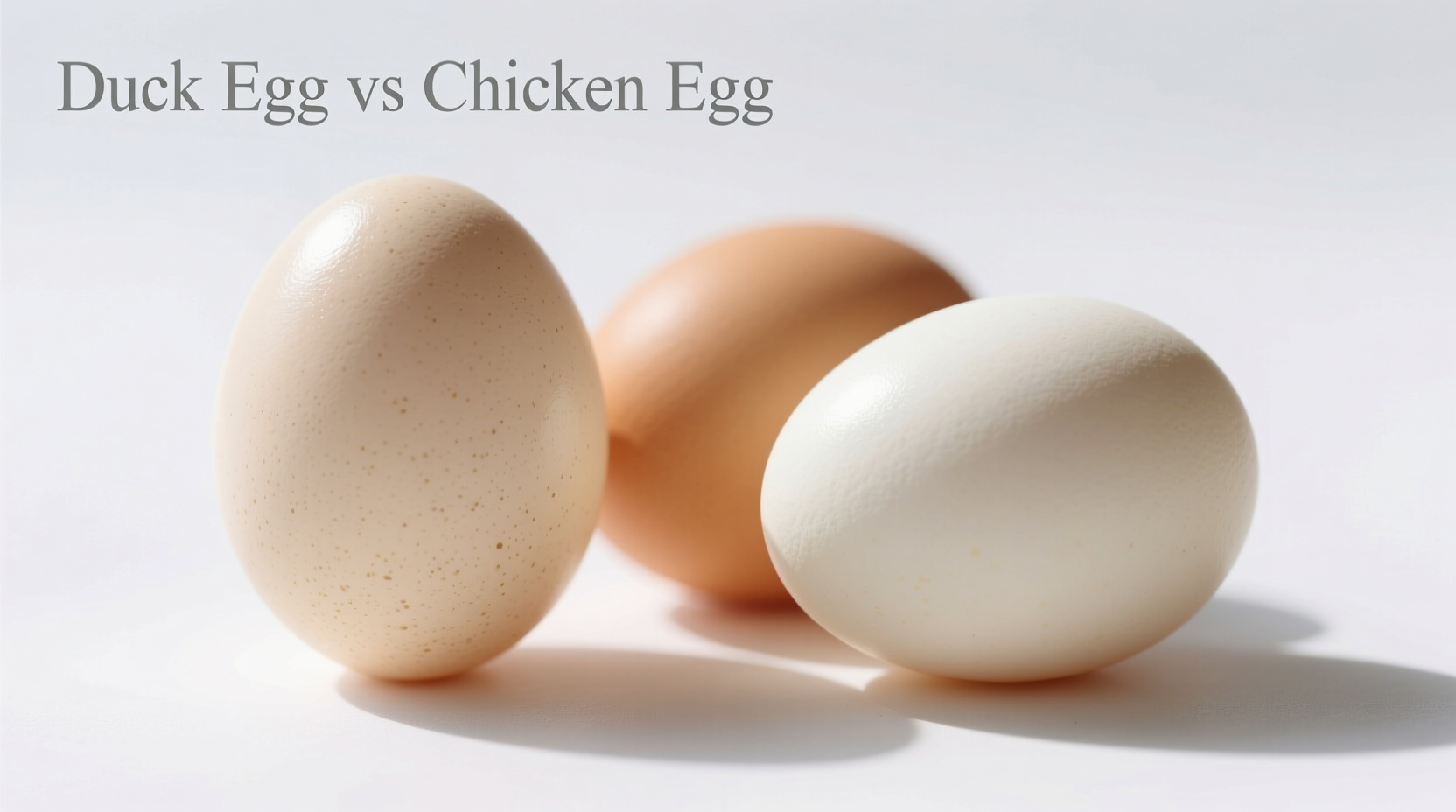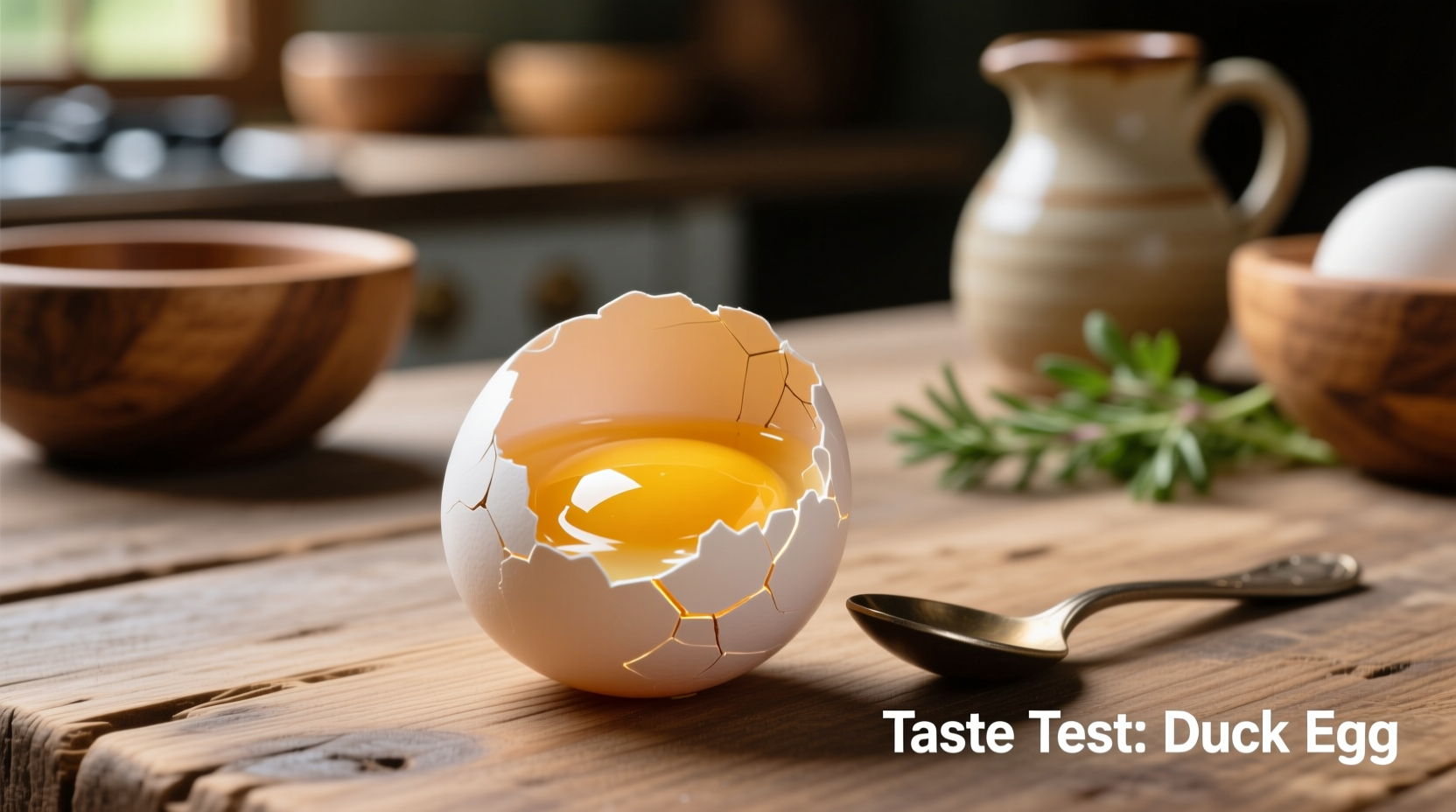If you've ever wondered what do duck eggs taste like compared to the chicken eggs in your refrigerator, you're not alone. As specialty eggs gain popularity among home cooks and professional chefs, understanding the distinctive flavor profile of duck eggs has become increasingly valuable. This comprehensive guide delivers exactly what you need to know before trying or cooking with duck eggs.
How Duck Eggs Taste Different From Chicken Eggs
The most immediate difference you'll notice when tasting duck eggs is their richer, more robust flavor. While chicken eggs offer a mild, familiar taste, duck eggs deliver a more pronounced eggy flavor with subtle mineral notes that many describe as 'more egg-like than chicken eggs.'
This distinctive taste comes from biological differences. Duck eggs contain approximately 30% more albumen (egg white) and have a higher fat and protein content than chicken eggs. The yolks are notably larger relative to the white, contributing to that signature richness.
| Characteristic | Duck Eggs | Chicken Eggs |
|---|---|---|
| Yolk color | Deep orange-yellow | Pale to medium yellow |
| Flavor intensity | Rich, robust, slightly gamey | Mild, neutral |
| Albumen (white) | Thicker, more viscous | Thinner, more watery |
| Fat content | Higher (especially in yolk) | Lower |
| Best culinary uses | Custards, ice cream, pasta, baking | General cooking, scrambling, frying |
Factors That Influence Duck Egg Flavor
Several elements affect how do duck eggs taste in your kitchen:
Diet and Foraging Habits
Ducks are omnivorous foragers with more varied diets than chickens, often consuming insects, small fish, and aquatic plants. According to research from the USDA Agricultural Research Service, this diverse diet contributes to the richer flavor profile and deeper yolk color in duck eggs compared to commercially raised chicken eggs (USDA ARS).
Freshness Matters More
Duck eggs have a thicker shell and cuticle layer that helps them stay fresh longer than chicken eggs—up to six weeks refrigerated. However, freshness significantly impacts taste. Older duck eggs develop a stronger flavor that some find unpleasant. For the most neutral duck egg taste comparison, use eggs within two weeks of laying.
Breed Variations
Not all duck eggs taste identical. Different breeds produce eggs with subtle flavor variations:
- Pekin ducks: Most common commercially; mild flavor similar to chicken eggs but richer
- Muscovy ducks: Slightly stronger flavor with more pronounced mineral notes
- Khaki Campbell ducks: Balanced flavor profile preferred by many chefs
Why Chefs Prefer Duck Eggs for Specific Applications
The unique properties of duck eggs make them superior for certain culinary applications. When professional bakers discuss what duck eggs taste like in baked goods, they consistently note improved texture and flavor.
Pastry chefs particularly value duck eggs for:
- Custards and ice cream: Higher fat content creates creamier texture
- Pasta making: Thicker albumen produces more elastic, restaurant-quality dough
- Cakes and pastries: Creates lighter, airier crumb structure due to stronger proteins
When asked about duck eggs vs chicken eggs taste in baking, Chef Thomas Keller of The French Laundry notes: 'Duck eggs provide superior aeration and structure in delicate pastries. The flavor is more pronounced, which works beautifully in rich desserts but requires adjustment in more delicate applications.'
Nutritional Differences That Affect Flavor
The nutritional composition directly influences how duck eggs taste. Per the USDA National Nutrient Database, duck eggs contain:
- Approximately 130 calories per large egg (vs 70-80 in chicken eggs)
- 10g fat (vs 5g in chicken eggs)
- 9g protein (vs 6g in chicken eggs)
- Higher levels of omega-3 fatty acids
- More vitamin B12 and iron
This denser nutritional profile contributes to the richer mouthfeel and more robust flavor that defines duck eggs. The higher fat content, particularly in the yolk, creates that signature creaminess that many culinary professionals seek.
When Duck Eggs Might Not Be Your Best Choice
While duck eggs offer distinctive advantages, they're not universally preferable. Understanding these duck egg taste limitations helps you make informed choices:
- Scrambled eggs or omelets: Their stronger flavor can be overpowering for simple egg dishes
- Light-flavored dishes: May dominate delicate recipes where neutral egg flavor is preferred
- Allergies: People allergic to chicken eggs often react to duck eggs too, though some tolerate them better
- Dietary restrictions: Higher calorie and fat content matters for those monitoring intake
Food science research from Cornell University's Food and Brand Lab indicates that consumer preference for duck eggs follows a U-curve—those with minimal egg experience or professional culinary training tend to prefer them, while average consumers often need adjustment time (Cornell Food Science).
Where to Find Duck Eggs and What to Expect
Finding duck eggs requires more effort than grabbing chicken eggs from the supermarket. Your best options include:
- Local farmers markets (ask specifically—many vendors sell them alongside chicken eggs)
- Specialty grocery stores (Whole Foods, Wegmans, and similar often carry them)
- Online specialty food retailers
- Backyard duck owners (check community boards)
Expect to pay 2-3 times more than premium chicken eggs. A dozen duck eggs typically costs $6-$12 depending on region and availability. When purchasing, look for clean, uncracked shells and ask about freshness—duck eggs from local sources are often days rather than weeks old, resulting in superior flavor.

How to Use Duck Eggs in Your Cooking
When substituting duck eggs for chicken eggs, remember these practical tips:
- Size adjustment: One large duck egg equals about 1.5 chicken eggs
- Whipping properties: Duck egg whites whip to stiffer peaks, ideal for meringues
- Cooking time: Requires slightly longer cooking due to denser composition
- Flavor pairing: Complements rich ingredients like cheese, mushrooms, and herbs
For the best introduction to what duck eggs taste like, try them in a simple custard recipe where their richness can shine without overwhelming other flavors. You'll immediately notice the creamier texture and deeper flavor that makes them a favorite among culinary professionals.
Do duck eggs taste fishy?
No, properly raised and fresh duck eggs don't taste fishy. Any fishy flavor indicates the ducks were fed inappropriate diets or the eggs are spoiled. Well-raised duck eggs have a rich, creamy flavor without fishiness.
Are duck eggs healthier than chicken eggs?
Duck eggs contain more nutrients per serving including higher levels of vitamin B12, iron, and omega-3s, but also more calories and fat. They offer nutritional advantages but should be consumed in moderation due to higher cholesterol content.
Can you eat duck eggs raw?
While some people consume raw duck eggs, they carry similar salmonella risks as chicken eggs. The thicker shell provides slightly better protection, but health authorities recommend cooking all eggs thoroughly regardless of type.
Why do duck eggs make better ice cream?
Duck eggs' higher fat and protein content creates a creamier texture in ice cream. The richer yolks produce a more luxurious mouthfeel and the stronger proteins help maintain structure during freezing and thawing cycles.











 浙公网安备
33010002000092号
浙公网安备
33010002000092号 浙B2-20120091-4
浙B2-20120091-4